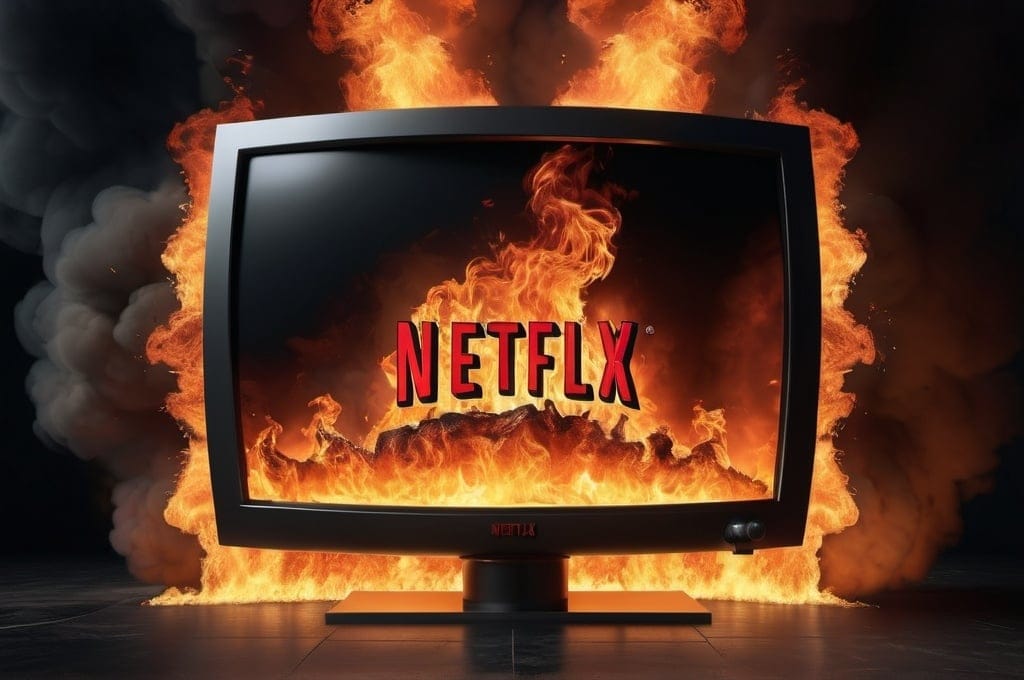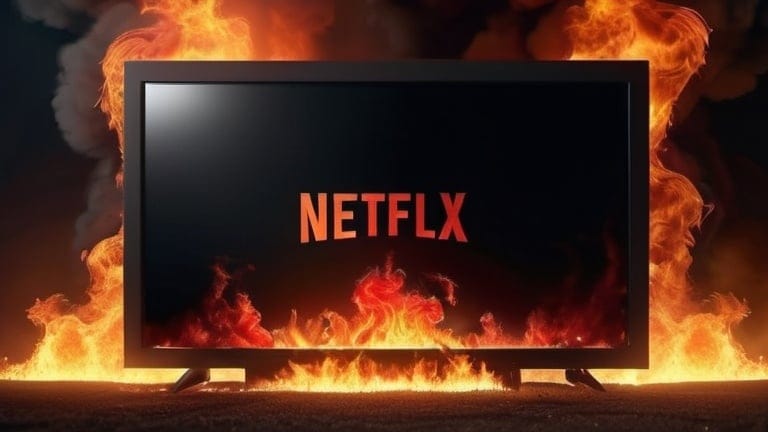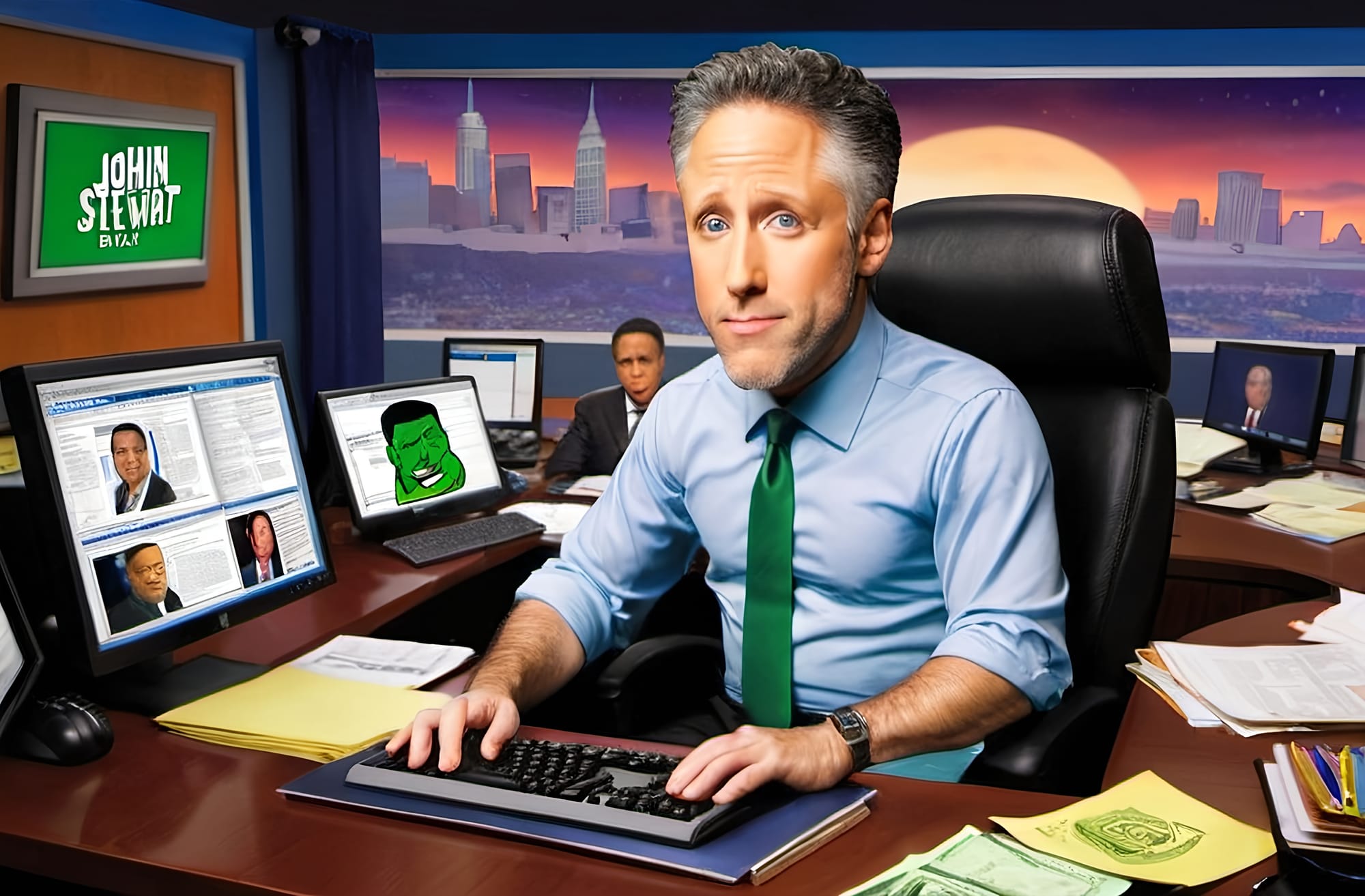On this page

From Blockbuster to Bust:
Analyzing Netflix's Decline Due to Content Strategy Missteps and International Focus
Why this take?
Netflix, once hailed as the king of streaming services and the disruptor of traditional television, has faced a tumultuous journey from its blockbuster success to a period of decline.
Let's delve into the reasons behind Netflix's downfall, focusing on its content strategy missteps and shift towards international content. Let's explore how Netflix went from being a powerhouse to facing challenges that have impacted its standing in the streaming industry.
I used to love watching Netflix. It was a great way to pass the time and I enjoyed a lot of the shows, but gradually over time it became more and more clear that what they were producing wasn't for me anymore.
It wasn't for their existing audience, either.
Unfortunately, much of their newest content doesn't seem like it was made for anyone at all.
Except, maybe computers.
The Rise and Fall of Netflix
Netflix's rise to dominance in the streaming world was nothing short of remarkable. With a vast library of movies and TV shows, original content that captivated audiences, and a user-friendly platform, Netflix quickly became a household name. The company revolutionized the way people consume entertainment, setting a new standard for streaming services globally.
One of the key factors that contributed to Netflix's success was its focus on quality content. From hit original series like "Stranger Things" to critically acclaimed films, Netflix consistently delivered content that resonated with viewers of all ages.
Unfortunately, even their strongest titles have been suffering lately from the changes they have been making.
The Shift in Content Strategy
Netflix subscriber counts started to falter. To stay ahead of the curve, Netflix began to shift their content strategy, placing a stronger emphasis on international content and creating shows by committee. It was no longer enough to make something a million people loved, they had to shoot for things that EVERYONE would love.
Successes like Squid Game only furthered the problem. Instead of being seen as a one-off fluke success that was not easy to replicate by design, they decided things like it would be their new strategy entirely. Squid Games should not have mass apppeal, but it was so compelling that it became must-see prestige television. It was not something they could just flip a switch and recreate over and over again.
While this move was aimed at appealing to a broader audience and diversifying its offerings, it also marked the beginning of Netflix's decline.
Netflix decided at some point that going deeper into their existing audience was a bad move and that breadth was their best chance for survival. After all, they could rely heavily on inertia, and the assumption that once people signed up it would be much harder for them to cancel.
So, it was time to start making content for new viewers and bring in people who had never subscribed before. Gen Z was a good target, as were international audiences. They already had their baked in audience, they figured.
By moving away from the unique storytelling and innovative content that had initially drawn viewers in, Netflix started to lose its edge. The focus on quantity over quality led to a dilution of the brand and a decrease in the overall viewer experience.
This dilution was slow and painful. The audience that had built the giant was no longer the one they cared about, and instead they were chasing the dragon of bringing in more people.
Let's dive in and examine some of their more recent missteps.
Cleopatra
Netflix went all in for Cleopatra.
It was a misstep for a lot of reasons, but Amala can actually explain it better than I can.
The Witcher
This one hurt the most, and it was honestly one of the saddest things to ever happen to a great show and actor. I loved the games and the books, and I am a huge fan of Henry Cavill. I'm excited about the prospects of his upcoming Warhammer screen adaptations (even though I am worried about what Amazon Prime might do to it, considering what they did to Lord of the Rings).
Cavill was barely even in the third season of the Witcher (less than twenty percent of the time) and it was another classic example of a bait and switch tactic. They had a show they wanted to make, and it wasn't about the books Andrzej Sapkowski wrote. The Witcher was just the vehicle for their intended message driven show and their prequel garbage, and once audiences who showed up for something true and meaningful bailed out they just screamed that the audience wasn't faithful.
Laughable, given the reality.
An example of what I mean: in the second season, they killed Eskel.
Why?
I guess it was to show they are big boys and girls over at Netflix willing to kill off important characters to show that they mean business.
But...
No one knew who Eskel was EXCEPT for the audience who read the book and knew he was important.
So, killing him off was not for the casual viewing audience who didn't even know it was an important death or WHY it mattered. It was only targeted at the book readers to show that Lauren S. Hissrich was willing to deviate completely from the source material and flip them the bird if it meant progressing her own intended story.
I can't even say much about the third season because I haven't managed to finish it yet. Early on, I actually loved the show and its ensemble cast, but the sheer force with which the showrunner was willing to completely demolish the source material to create her own show and spite fans was a sight to behold.
I plan on delving a lot deeper into this tragic misstep in a separate article, but it is one of the most heartbreaking things I have ever seen.
Resident Evil
Next up is resident evil. I grew up on the game and was so excited to hear they were making a Netflix series related to it. I loved the movie series with Mila Jovovich in it (as campy as it was) and I was all in for making this show a reality.
However, when I actually turned it on, I made it about thirty seconds into the show before I was completely done with it. The entire opening was laughably terrible and painful to watch, and the entire "dive through the poles and it creates an explosion that stops all zombies in their tracks" thing was just too much for me and I ended up turning the show off.
Maybe I'm just a curmudgeonly old man, but it has a 26% on Rotten Tomatoes. The rating from reviewers is higher, but generally speaking after The Last Jedi I don't trust review scores from most reviewers at all anymore. They will shill for whatever garbage they are asked to for the right price.
The thing is, Resident Evil was definitely 100% not made for me, and that is okay. But, who was it made for? It doesn't seem like they had any real audience in mind, and at the very least we can say that their intended audience didn't show up for it.
The Impact of International and Gen Z Focus
Netflix's increased focus on international content was a double-edged sword. While it allowed the platform to cater to a more global audience and expand its reach, it also led to a dilution of the content that made Netflix stand out.
International audiences, it turns out, don't necessarily want to watch an American companies television. Competition had easy marketing campaigns against Netflix, and Netflix had an uphill battle. Worse, their core audience at home was being given this content as if it was for them when it clearly wasn't.
But, the second focus that hurt even more was Gen Z.
Wokeness, gender fluidity, and other core principles of Gen Z lifestyle are all consuming on social media, particularly Tik Tok. If you make a show or movie you will get a LOT of people giving their "hot takes" on social media about the problems with the film. Take the new Dune 2, for example, which has been getting a lot of social media attention related to it's white savior attitudes.
Gen Z is growing up and soon to have the most expendable income. They benefitted quite a bit from the pandemic in stepping into good jobs previous generations had to work a long time for simply because immigration slowed for many years.
So, naturally, Netflix rubbed their greedy hands together and said: "this is who will help us grow..."
The only problem?
Gen Z doesn't really watch long form content.
Most of what they consume is on TikTok, YouTube, and various other shorter form platforms. Sure, they love to attack your content if it isn't as diverse, gender fluid, or progressive as they expect it to be, but when you make content specifically for them, they won't actually watch.
They'll just watch other TikToks talking about it.
The entire industry has gone all in for courting this new generation, especially with Disney, and all it has actually done for them is help release flop after flop and lose billions of dollars. Girl bosses and diversity dominate almost all new mainstream releases and no one is interested. The target audience would never have actually watched it and gets their entertainment elsewhere, and the audiences for this content were pushed out by the desire to court newer ones.
What has come from it?
Like with Madam Web, the end result is that when you court a female audience and men don't show up, you blame the men who didn't show up for why the film failed, not the mythical female audience that never existed in the first place that you courted.
Netflix has continued to push out their existing audience in favor of courting international and Gen Z audiences, and neither of those have gotten on board. Unfortunately, the inertia that Netflix has been relying on to keep them afloat is wearing thin and more of the people who subscribed and forgot are finding ways to cancel their memberships and move on.
Other platforms are facing similar struggles, but many of them have better offerings for the audience that Netflix is losing. Peacock, for example, released many excellent television shows. Twisted Metal, Resident Alien, and more that are more focused on appealing to the core audience of viewers that Netflix has completely abandoned.
They must be praying that Stranger Things will be enough to bring them back, but even that shows early signs of Netflix meddling to make the show more "appealing".
Viewers began to notice a shift in the quality of Netflix originals, with many feeling that the platform was no longer delivering the same level of compelling storytelling that had once set it apart.
Additionally, the shift towards creating shows by committee, where decisions are made based on data and algorithms rather than creative vision, further alienated audiences.
Viewers crave authentic storytelling and unique perspectives, and Netflix's move towards a more formulaic approach left many feeling disconnected from the content.
We crave feeling like the content creators we rely on actually care about us, and when they show us that they care more about someone else we move on.
No matter how much they scream at us that we aren't "woke" enough to "get it" we still don't really want to go back.

So, what's next?
Who knows?
Honestly, I think their financial troubles might be enough to tank them. Overseas, most countries are developing or have already built up competitors that service their citizens better, and honestly the hodgepodge cluster that Netflix has become doesn't really suit anyone.
They could have gone all in toward maintaining their audience and building brand loyalty, but instead they went all in for courting new audiences at the expense of existing ones.
Something in the data must have told them it was a good idea. Hell, maybe they were right considering how long it took me to cancel my membership once I started.
That being said, I won't mind if/when Netflix shutters, and the only real tragedy of it is that the model they have forced upon the world isn't sustainable. They have wrecked the movie and film industry, dragged woke ideology and cultural messaging into modern entertainment, and it's going to take years or decades to decouple those things once more.
That's my take on things, anyway. Who knows if I'm right.




